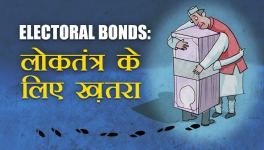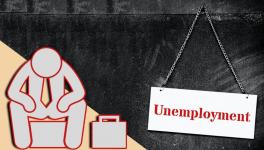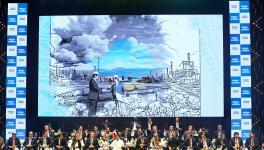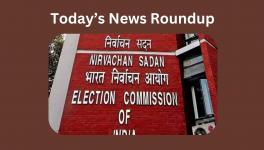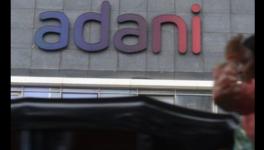Rs. 29,000 Cr Coal Scam: Who are the Real Culprits?
There appears to be a major scam involving some of India’s mightiest companies like Adani Group and Anil Dhurubhai Ambani Group and forty of India’s biggest energy companies. This is currently under the Directorate of Revenue Intelligence (DRI) scanner. Conservative estimates put the amount involved at nor less that Rs. 29,000 crore, which then is passed onto the electricity consumer in the form of higher power tariffs.
What was the exact modus operandi of these companies? What did the companies actually do to inflate the price of coal that they were importing? How did this scam come to light? To discuss and to know more about these issues Newsclick interviewed Editor, Economic & Political Weekly, Paranjoy Guha Thakurta, who exposed the scam.
Rough Transcript:
Bipin Chandran (BC): Hello and welcome to Newsclick. There appears to be a major scam involving some of India's large corporations like the the Adani Group and Anil Dhirubhai Ambani Group and also another 40 Indian large energy companies. These companies are currently being investigated by the Directorate of Revenue Intelligence (DRI). Conservative estimates put the money involved at around Rs. 29,000 Crore. Which has been passed on to the consumers as increased electricity prices. To discuss this issue, we have with us Editor, Economic and Plitical Weekly Paranjoy Guha Thakurta. Paranjoy, thank you for joining us. How did this scam come into light?
Paranjoy Guha Thakurta (PGT): Me and my colleagues, we broke this story for the Economic and Political Weekly on the evening of the 4th of April 2015. We had been working on the story for some time. We had received the information indicating that there was a huge scandal and this was scandaled at run into nearly 30,000 crores, or 29,000 crores. It had been reported earlier because on December 2014, the Directorate of Revenue Intelligence which comes under the Ministry of Finance had read it, conducted search and seizure in about 80 odd establishments across the different parts of the country. So when I learned that a general alert had been issued by the DRI to 50 odd customs establishments across the country and there was a detailed note outlining the modus operandi of the way in which the coal which was being imported from Indonesia was being over invoiced. This information I put in the public domain and I learned for the first time there were 40 companies and these were 40 of some of the best known energy companies in India. It included about 6 companies belonging to the Adani Group headed by Mr. Gautam Adani who is a business person, who is known to be close to Prime Minister Narendra Modi. There were other companies included companies that were part of the ADAGD Anil Dhirubhai Ambani Group. There were companies in the SR Group promoted by the Ruhia family. There were companies. There was company like JSW Steel headed by Sajjan Jindal is the same steel magnate who helped Mr. Modi have this appointment with Mian Nawaz Sharif in Pakistan. There were companies in the Hyderabad based NSL Group which is promoted by Mr. Venkat Ramiah and Prabhakar Rao. There was India Cements which is led by Mr. N. Srinivasan who is the former ICC Chairman. There was Uttam Galba steel led by Rajendra Miglani among other companies. We found that these were the private players and there was public company involved. There were not just electricity board. Tamil Nadu Electricity Board, The Gujarat State Electricity Corporation, the Haryana Power Generation Cooperation, they were also very prominent public sector organisation which is part of the network including India's largest electricity generating company NTPC formally National Thermal Power Corporation. Then there were companies like MMTC formally Metals and Mineral Trading Corporation, MSTC formally Metal Scrap Trading Corporation and what has happened is it was found that all these companies were part of the network where you were importing coal and you were inflating the prices often as much as 40 to 50 percent. These costs were being passed on to ordinary users of electricity. So it was not just these companies that were in a sense defrauding the the exchequer but there was an element of fraud that was being committed on ordinary uses of electricity and according to the calculations that have been made by the DRI, the price of one unit of electricity, one kilowatt hour of electricity would have gone up by one rupee or one fifty rupee. So if you are paying actually 3 rupee, 4 rupee or 5 rupee is for one unit of electricity that you consume, by manipulating, by defrauding and this is not me but what DRI is alleging the price that was being paid by the consumer electricity was going up between 1 rupee and 1.5 rupee per kilowatt hour. So in a sense this huge scam running into almost 30000 crore rupees, about third of it was in the form of money that was being taken from ordinary consumers of electricity and indirectly or directly benefiting these companies these forty companies which are being investigated by the DRI. What was happening is the extra amount of money so if the actual price, the landing price of the coal should have been say 40 dollars, but it is showing as 80 dollars what happens to the remaining money. This is the money that bas been taken illegally out of the country and it was found that there was a network of companies, not just Indonesia, Singapore, Hongkong, Dubai. Dummy companies being floated, invoicing you know from one to another and there was just elaborate scam which the DRI has unearthed and time alone will tell how the investigations proceed. So far at least one individual, Manoj Kumar Garg who is involved in various other scams, He has been arrested, he has arrested on the 27th of February 2016 and he was allegedly operating a front company in Dubai and over valuing imported coal worth about 280 crore meant for the state electricity board in Tamil Nadu and Karnataka. But my sources tell me that this is just a tip of the ice berg. My sources in the ministry of finance believes that this is a huge scam which need to be investigated in in detail.
BC: What did these companies do actually to inflate the price? What was their real modus operandi?
PGT: You see typically what would happen is that India has preferential trade agreements with several countries including a country like Indonesia. Now, these provide for concessional duties. So for instance, when steam coal isimported from Indonesia, it attracts no basic duty. But to avail of this concession, the import has to produce what is called a certificate which shows the country of origin. What is happening is that many of these documents were forged and what was happening is that many of these transactions were taking place on high seas. That means coal is moving from a port in Indonesia to a port in India but while it is on the high seas there have been changes. The transactions, the buyers and sellers have been taking as a result of which the whole idea is you have this multiple transactions so that was that one of the ways in which you inflate your costs. Now, what happens is the freight on board that is the price which is when the freight is on board, of these coal. Now, in Indonesia varied two years ago, between 30 and 37 dollars for a ton. You add to that the freight charges for delivery for the ports on the eastern coasts of India and you another ten to 12 dollars per ton. So the range is between 40 dollars a ton to 50 dollars a ton. But what you actually showing on your invoice is twice that amount, 80-85 dollars. The whole idea is that one is the manipulation of the invoicing. It didn't stop over there. There was another way in which the manipulation was taking place and what was that, it was on the quality and you have laboratories which are supposed to certify the quality. The technical word for it GCF, The Gross Calorific Value. Now, higher the gross calorific value the higher is the price of coal, the more expensive it is. What was happening, there were different testing agencies for the same consignments and they were being bribed, the laboratories concerned were being bribed, certificates you have of sampling and analysis were being manipulated and this is how the whole transactions were, all of these resulted in the prices going up. These are series of transactions, this is typical of money laundering you know layered transactions. One layer of the another layer of the another layer.
BC: This has been going on about five years and what could have been the impact on the price that consumers like I and you would have?
PGT: You know, according to the DRI and it is not my view, each unit the price we were paying could have been lower by one rupee or one fifty rupee and mind you, this is over a period of five or six years this has been happening and the amount that you have been talking about may not be the actual amount because here we are talking about one set of violations. These companies are violating a lot of other rules. They could have been violating the income tax act, the FEMA, the PMLA, Prevention of Money Laundering Act and just look at it. In 2014-15, that is the year that ended in 31st of March 2015, India imported just from the coal imports that India had imported were about 212 million tonnes and these were worth over a 100,000 crores. So I am merely saying that if you look at the huge amounts of coal that we are importing and the variety of reasons why
A) the quality of coal that is available in India is inferior and all how often inadequate in the recent past India has been importing somewhere around 15 to 20 percent of the countries total requirement of coal. We have abundant reserves but there have been all kinds of problems in coal mines and also the quality of that coal. So just to give you an idea what the DRI has investigated and found may be a very small part of a huge racket and as I was telling you according to the official data, the amount of coal that we are importing is huge. It is over 100,000 crores. Of late, the prices have come down because all commodity prices have come down but as I was saying in the fiscal year 2014-15, this amount was over a 100,000 crores.
BC: As you have said, some of these companies are known to be close to certain political parties who have been in power at the centre. Is it a political nexus as well?
PGT: You know it is for the government to find out. It is for the investigatng agencies to find out. It is for the enforcement directorate, income tax department, it is for the directorate of revenue intelligence. These are all working under the Ministry of Finance for other agencies like the RBI, it is for the agencies like SEBI to ascertain who are the people involved, whether there is any criminality involved, what are the nature of the allegations. But the initial evidence seems to indicate that this has been a huge racket and some very very important companies run by some very very influential individuals, their companies are being investigated. What the DRI finds, how the investigations takes place only time alone can tell. How the judiciary, the process it will follow, you know what is the process? After the investigations are complete, you are supposed to issue show cause notices. Then it goes through various process. You have a Appellate Tribunal, then you have the courts of the land. So I think, all of this will take some time before the investigations or the denouement or the outcome of the investigations reach their logical conclusions. So time alone can tell whether or not certain influential people will be indicted in this scam.
BC: Do you also think that tax havens have been used to sort of do this transactions and …
PGT: Undoubted. If you go by the preliminary data that is involved the tax havens are among the definitely entities that are registered in this tax havens. These are no tax or low tax jurisdiction, you very often find that the different layers in the transactions that take place tax havens are definitely involved in the way the money gets routed and the way the money travels very very rapidly often at a lightning speed across different jurisdictions. This is a process called round tripping, this is a process called treaty shopping and you definitely do find tax havens are being misused for such apparently illegal activities.
BC: And the quality of the coal imported is also under question. Does it mean that the electricity produced was of low quality and there was obviously an environmental impact?
PGT: Just likely a complicated question. Power tariffs are fixed by electricity generating companies and distributing companies. These companies are regulated at central level by the CERC, Central Electricity Regulatory Commission and there are various state regulatory commissions. Typically, the tariffs comprise two parts. There are two components. One is called capacity charges for recovery of annual fixed charges or capital costs and energy charges which are for the recovery of the cost of fuel, the primary fuel cost. Now, what happens is the energy charges that are recovered by the power generating units from the distribution companies are based on the cost of the fuel that is consumed. Thus, if you artificial enhance the price of the imported coal you are able to get a higher tariff and pass it on to the consumer. Now, all these companies that are involved, all these companies, the companies Adani Group, the companies in the ADAG, Anil Dhirubhai Ambani Group, the India Cements, various other companies, the JSW Steel and the Ruia Companies, Uttam Galva Steels and NSL Group and whole lot of others Gandhar Group, Bhatia Group, Gupta Coal, MBG, commodities, knowledge and infrastructure, all of these claim that they have not violated law. That the DRI's allegations are incorrect. But at the end of the day it is up to the Directorate of Revenue intelligence to prove in a court of law whether their investigations have yielded any violation or what kind of violation of law and whether criminal intent can be established or not. These are issues that have to be determined by tribunals and courts and are such law enforcing bodies. So the justice system will have to decide who is guilty or who is not.
BC: Thank you Paranjoy. Thank you so much for joining us.
DISCLAIMER: Please note that transcripts for Newsclick are typed from a recording of the program. Newsclick cannot guarantee their complete accuracy.
Get the latest reports & analysis with people's perspective on Protests, movements & deep analytical videos, discussions of the current affairs in your Telegram app. Subscribe to NewsClick's Telegram channel & get Real-Time updates on stories, as they get published on our website.












